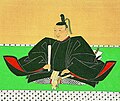Shitennō (Tokugawa clan)
Appearance
The Four Heavenly Kings of the Tokugawa (徳川四天王, Tokugawa-shitennō) is a Japanese sobriquet describing four highly effective samurai generals who fought on behalf of Tokugawa Ieyasu in Sengoku period. They were famous during their lifetimes as the four most fiercely loyal vassals of the Tokugawa clan in the early Edo period.[1]
Etymology
The sobriquet evolved from the "Four Heavenly Kings" of Buddhist iconography. These are said to be the guardians of the four horizons.[2]
Fudai leaders
Each of these four generals was the founder of a cadet branch clan:
- Honda Tadakatsu[3] of the Honda clan[4]
- Ii Naomasa[5] of the Ii clan[6]
- Sakakibara Yasumasa[1] of the Sakakibara clan[7]
- Sakai Tadatsugu[1] of the Sakai clan[8]
Tokugawa Four Gallery
-
Ii Naomasa
(1561–1602) -
Honda Tadakatsu
(1548–1610) -
Sakakibara Yasumasa
(1548–1606) -
Sakai Tadatsugu
(1527–1596)
See also
Notes
- ^ a b c Nussbaum, Louis Frédéric et al. (2005). "Sakakibara Yasumasa" in Japan Encyclopedia, pp. 811., p. 811, at Google Books; n.b., Louis-Frédéric is pseudonym of Louis-Frédéric Nussbaum, see Deutsche Nationalbibliothek Authority File.
- ^ Nussbaum, Louis Frédéric et al. (2005). "Shi-tennō" in Japan Encyclopedia, pp. 875., p. 875, at Google Books; n.b., Louis-Frédéric is pseudonym of Louis-Frédéric Nussbaum, see Deutsche Nationalbibliothek Authority File.
- ^ Nussbaum, "Honda Tadakatsu" at p. 347., p. 347, at Google Books
- ^ Appert, Georges. (1888). "Honda" in Ancien Japon, pp. 65., p. 65, at Google Books
- ^ Nussbaum, "Ii Naomasa" at p. 374., p. 374, at Google Books
- ^ Appert, "Ii" at Ancien Japon, p. 67., p. 67, at Google Books
- ^ Appert, "Sakakiwara" at Ancien Japon, p. 77., p. 77, at Google Books
- ^ Appert, "Sakai" at Ancien Japon, p. 76., p. 76, at Google Books
References
- Appert, Georges and H. Kinoshita. (1888). Ancien Japon. Tokyo: Imprimerie Kokubunsha. OCLC 4429674
- Nussbaum, Louis Frédéric and Käthe Roth. (2005). Japan Encyclopedia. Cambridge: Harvard University Press. ISBN 978-0-674-01753-5; OCLC 48943301
Further reading
- Bolitho, Harold. (1974). Treasures Among Men: The Fudai Daimyo in Tokugawa Japan. New Haven: Yale University Press. ISBN 978-0-300-01655-0; OCLC 185685588




